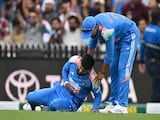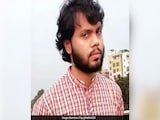(Ashutosh joined the Aam Aadmi Party in January 2014. The former journalist took on former Union minister Kapil Sibal and Health Minister Harsh Vardhan in the national election from Chandni Chowk in Delhi.)
Sting operations as a potent tool for investigative journalism are in vogue once again for the last few days but not for good reasons. The last week has seen many so-called sting operations that created a stir in political corridors and each one rubbed AAP the wrong way. The funny part is that none of these was carried out by a journalist. It was carried out by political actors who were/are part of the political slugfest.
Two of the operations were done by the volunteers of AAP itself. It was a serious attempt to inflict a fatal blow to Arvind Kejriwal's public persona. One sting tried to portray Arvind as someone who wanted to break the Congress party and form the government by wrong means. The other was to showcase him as anti-Muslim. Both the stings were mischievous and were largely misinterpreted to project Arvind being no different than other politicians; painting him with the same brush as others.
The third sting never saw the light of the day. In fact it was a classic case of media manipulation in an era of competitive TV journalism. Congress leader Asif Khan made a sensational allegation that he had an audio recording with senior AAP leader Sanjay Singh in which he was seen to be making some deals with him for government formation. All the TV channels scrambled to get him on air without bothering to review the so-called audio tape. He was on all the channels but none had his audio tape. It was a curious case of irresponsible journalism.
This entire situation raised certain fundamental questions about the ethics of journalism. I had run a TV channel as an editor for eight years and never run any information whose ownership was not proved. We are trained as interns to verify information at least from two sources before airing or making any information public. That is the fundamental rule. But here the first tape whose ownership was not clear was run by all the channels. The man in question, Rajesh Garg, who is supposed to have recorded the conversation with Arvind, refused to own up to the fact that he had leaked the tape. This puts the onus on the broadcasters to verify the authenticity of the tape. Every channel ran that audio tape without verifying the authenticity. Nobody bothered to examine if the tape was manipulated, doctored or edited to suit a particular purpose. No channel went to any forensic lab to check if the voice recoded was genuine and belonged to the person they claimed it did.
This was rather startling as the Supreme Court guidelines are very clear. No audio tape purporting to have voices of two individuals can be aired if the recording was not authorised by a designated senior official of the Home Ministry or police official. Secondly, it can only be done if there is public interest and, finally, the authenticity of the tape is proved beyond doubt. Here was a curious case. Broadcasters were openly saying that they could not vouch for the authenticity of the tape but they were having a vociferous debate about the content of the tape and were making all kinds of allegations against AAP.
I remember that when I was an editor, a consensus was developed among all the promoters and editors that unless the authenticity of the tape was proved, it should not go public. The same logic was applied to many cases especially when the "snoop gate" tapes surfaced. Many channels refused to air the recorded voices as the tapes were not authenticated. But the same rule was not applied this time and serious allegations of political horse-trading and practicing communal politics were levelled against Arvind and AAP.
The case of third non-existent tape was more perplexing. For a good two days, Asif Khan claimed that he had an audio clip which would prove that Sanjay Singh was doing a deal with him to form the government in Delhi with the support of Congress MLAs. This story ran for two full days. It was also said that Asif would produce the tape either that evening or sometime the next day, but that never happened. On the third day, when he was confronted, he just showed a pen drive claiming it might have a few clips. He refused to share that also. I am still waiting for that non-existent audio tape to surface. It was a clear case of media being manipulated. The media ran a story based on his claims without verifying if he had a tape or not. Sanjay Singh was traumatised. He vehemently denied it all and said if such tapes surfaced, he would leave politics. His version was not taken seriously. Asif's words were taken as gospel truth.
As a former editor, who has spent considerable time in media and one with a certain reputation, I can say that media crossed its Lakhshman Rekha in its zeal to compete with others. It was irresponsible journalism. I would have forgotten and forgiven if the error had been committed by cub reporters but if celebrity anchors and top TV editors start asking questions based on the content of the tape without being sure of the veracity, then it raises certain questions. Why should I not believe that it was done with a purpose and intention to malign the image of the party and its leader, Arvind? I refused to believe that these senior editors had no knowledge of the Supreme Court (SC) guidelines and also of the NBSA which clearly spell out in what circumstances an audio or video tape can be aired.
When I asked one of the most high-profile anchors of an English Channel why 'snoopgate' and 'bank scam' tapes were not run, I was told that it was the editor's right to choose which story he/she wanted to run. Agreed, but is it justified to run a tape without verifying the authenticity of the sting and reaching conclusions on the basis of claims whose veracity is not proved? Can I ask the question that if a tape of a similar nature had surfaced involving Mr. Modi or senior cabinet minister of the BJP, would the media have behaved the same way? The 'Snoopgate' case suggests it would not have.
It is this aspect which forces me to conclude that AAP and Arvind Kejriwal are a soft target, a punching bag for the media. Or, despite having a tremendous respect for press, should I believe that there is an attempt in a section of the media to act at the prompting of others whose identity I don't want to talk about now but who don't want AAP to grow in stature? Either way it does not add stature to the media which is perceived to be the watchdog of Indian democracy and considered to be the fourth pillar of democracy.
Disclaimer: The opinions expressed within this article are the personal opinions of the author. NDTV is not responsible for the accuracy, completeness, suitability, or validity of any information on this article. All information is provided on an as-is basis. The information, facts or opinions appearing in the article do not reflect the views of NDTV and NDTV does not assume any responsibility or liability for the same.
This Article is From Mar 17, 2015
AAP as a Target of Stings
Advertisement
Topics mentioned in this article















